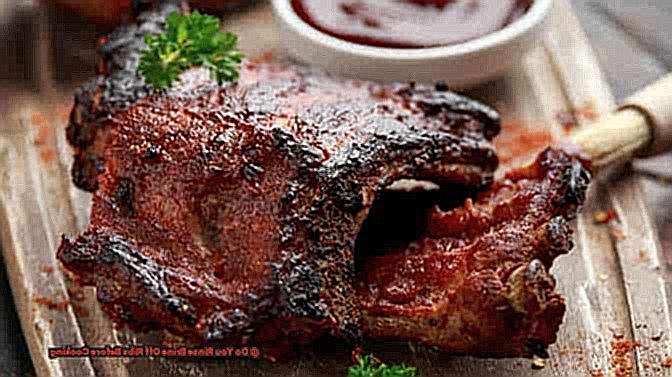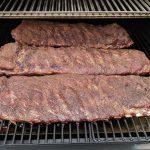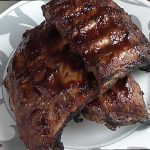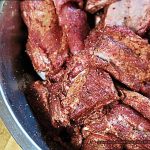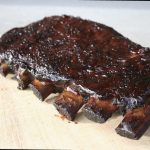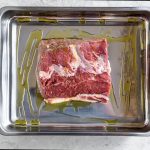Imagine sinking your teeth into succulent, tender ribs that have been slow-cooked to perfection. But before you start salivating, the question arises: should you rinse off the brine before cooking? This topic has sparked many a debate among BBQ aficionados, with strong opinions on both sides. So let’s get down to the meaty details:
- Brining involves soaking meat in a saltwater solution to enhance its flavor and texture.
- The salt in the brine breaks down tough muscle fibers and allows for better absorption of flavors.
- However, if not rinsed off properly, the excess salt can make the ribs too salty or dry them out.
- On the flip side, some argue that leaving the brine on adds an extra layer of flavor and moisture to the meat.
So, what’s a hungry rib-lover to do? Join us as we explore the benefits and drawbacks of rinsing off brine from ribs before cooking and settle this BBQ dispute once and for all.
Contents
How Is Brining Different From Marinating?
When it comes to enhancing the flavor and texture of meat, two popular methods are brining and marinating. These techniques may seem similar, but they have distinct differences that can greatly impact the final result.
Brining is a process that involves soaking meat in a saltwater solution to add moisture and flavor. This method requires more time compared to marinating, as the meat needs to sit in the brine for several hours or even overnight. On the other hand, marinating can take as little as 30 minutes or up to 24 hours, making it a quicker option.
Another important factor to consider is the type of meat being prepared. Brining is most effective for lean meats such as chicken and pork loin, while marinating works better for tougher cuts of meat like ribs. The salt in brine helps to break down muscle fibers and make the meat more tender, while the acidic components in marinades work to tenderize the meat by breaking down its proteins.
In terms of flavor, both methods have their advantages. Brining allows for even distribution of flavors throughout the meat, resulting in a well-seasoned and moist final product. On the other hand, marinating offers more flexibility and experimentation with different flavor combinations.
Advantages Of Brining Ribs
The process of brining ribs involves submerging the meat in a solution of water, salt, and other seasonings before cooking to achieve the perfect BBQ ribs. This method offers numerous advantages and is highly recommended for those seeking the ultimate rib experience. Let’s take a closer look at the benefits of brining ribs before cooking:
- Enhanced Juiciness: By infusing moisture into the meat, brining results in more succulent and flavorful ribs.
- Improved Flavor: The salt in the brine permeates the meat, enriching its natural flavors and intensifying its taste.
- Improved Tenderness: For leaner cuts of meat, such as baby back or spare ribs, brining can help tenderize them, leading to more tender and juicy ribs.
- Increased Shelf Life: Acting as a preservative, the salt in the brine extends the shelf life of the ribs, allowing them to be stored for longer periods without spoiling.
- Prevents Drying Out: During cooking, the brine prevents the ribs from drying out, ensuring they remain moist and tender.
- Creates Crispier Bark: Dry brining, which involves rubbing salt on the surface of the ribs and then refrigerating them before cooking, can produce a crispy bark on the outside of the ribs.
- Removes Smell: Brining can also eliminate any unpleasant smells from cryovac’d pork ribs, making them more appealing to cook and eat.
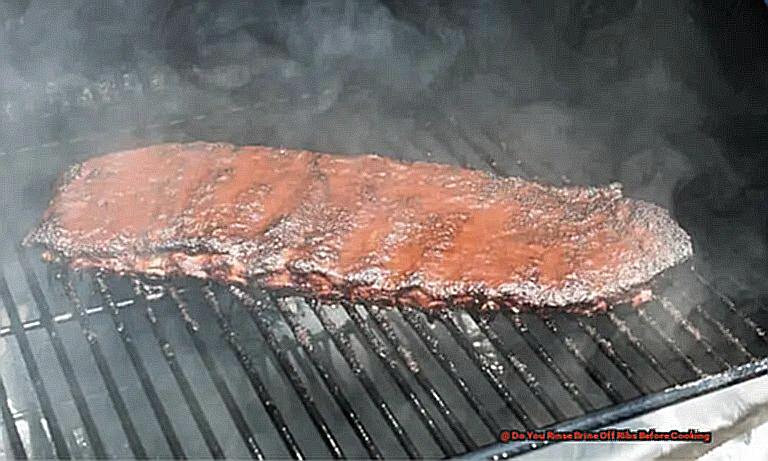
Brining ribs is an extremely beneficial technique that can significantly improve the flavor, tenderness, and overall quality of your BBQ ribs.
Disadvantages Of Brining Ribs
Brining ribs can offer numerous advantages, but it’s important to be aware of potential drawbacks before using this technique for your next BBQ.
These include the risk of oversaturation with salt, increased cooking time, and the need for different brine recipes and times based on the cooking method. Let’s delve into each of these factors in more detail.
Oversaturation with Salt:
Salt is a crucial ingredient in brine solutions, as it helps to tenderize the meat and infuse it with flavor. However, if the ribs are left in the brine for too long or if the solution is too concentrated, they can become oversaturated with salt.
This can result in overly salty ribs that may not be as enjoyable to eat. To avoid this, it is crucial to follow a well-balanced brine recipe and adhere to the recommended brining time.
Increased Cooking Time:
Brining ribs requires preparation time as well as several hours for the meat to soak in the solution. This added time may not be suitable for those who want to cook their ribs quickly or do not have enough time to spare. Additionally, if you are using a dry rub or marinade in addition to brining, this will further extend the overall cooking process.
Different Brine Recipes and Times:
Different cooking methods may call for varying brine recipes and times. For instance, low-and-slow techniques like smoking can accommodate longer brining times (up to 24 hours) with more complex recipes, while high-heat methods like grilling may only require 4-6 hours with a simpler mix. This means that you must adjust your brine recipe and plan accordingly depending on how you intend to cook your ribs.
In conclusion, while brining ribs can yield succulent and flavorful BBQ ribs, it’s crucial to keep these potential drawbacks in mind before using this technique for your next cookout.
How Long To Brine Ribs Before Smoking?
To achieve the utmost flavor and tenderness, it is recommended to brine ribs for 6 to 8 hours before smoking. This allows ample time for the brine to fully penetrate the meat and infuse it with flavor, while also preventing the ribs from becoming overly salty. However, if time is limited, even a 2-hour brining period can yield some benefits.
Brining ribs before smoking has become a beloved technique among BBQ enthusiasts as it helps to retain moisture and enhance flavor. The process involves soaking the ribs in a saltwater solution that is combined with other seasonings and spices, resulting in a flavorful and succulent dish.
When it comes to smoking ribs, a wet brine is preferred over a dry rub as the slow cooking process can lead to dryness in the meat. Wet brines are created by mixing salt, sugar, and various spices in water. The salt helps to break down proteins in the meat, resulting in a more tender and juicy end product.
To make a basic brine for ribs, combine 1 cup of salt, 1/2 cup of sugar, and water in a large pot or container. Additional seasonings like garlic powder, smoked paprika, onion powder, black pepper, chili powder, cumin, or other herbs and spices can be added to customize the flavor of your ribs.
After preparing the brine, place the ribs in the container and ensure they are fully submerged. Cover and refrigerate for 6 to 8 hours to allow the brine to fully work its magic on the meat.
Once brining is complete, remove the ribs from the container and pat them dry with paper towels. This will help create a crust on the outside of the ribs when smoked. Smoke the ribs at a low temperature (around 225°F) for approximately 4-5 hours until they are cooked through and tender.
How To Brine Ribs?
Brining ribs serves the purpose of enhancing their flavor, tenderness, and juiciness. The most recommended approach for brining ribs is the wet brine method, which involves a proportion of 1 cup of salt per gallon of water.
Alternatively, you can choose the dry brine method where you rub a dry mixture of salt and spices onto the ribs. Brining helps in preventing the ribs from drying out while cooking and also reduces cooking time. It is essential to remove any excess fat or silver skin from the ribs before brining and refrigerate them during the process.
However, be cautious not to over-brine as it can make the ribs too salty. Therefore, it is crucial to follow the recommended brining time.
A good brine recipe for ribs comprises water, sugar, salt, spices, and apple cider vinegar. After completing the brining process, rinse off any extra salt and pat dry before adding any additional seasonings or marinades.
How To Dry-Brine Ribs: A Step-by-Step Guide
Dry-brining ribs is a straightforward and highly effective technique for elevating the flavor and tenderness of ribs prior to cooking. This process involves creating a brine mixture and allowing the ribs to marinate in it for several hours. Below are the steps for properly dry-brining ribs:
Step 1: Preparing the Ribs
Before dry-brining, it is crucial to properly prepare the ribs. This includes removing the membrane from the back of the ribs and trimming any excess fat. Additionally, patting the ribs dry with paper towels is essential to ensure that the brine can evenly penetrate the meat.
Step 2: Creating the Brine
The next step is to create the brine mixture. The typical ingredients for a dry-brine include salt, sugar, and desired herbs and spices. The general rule of thumb is 1 tablespoon of salt per 4 pounds of ribs, but different recipes may call for varying amounts. Therefore, it is important to follow the specific instructions for your chosen recipe.
Step 3: Applying the Brine
Once the brine mixture is prepared, it should be evenly spread over both sides of the ribs. It is crucial to massage the brine into the meat thoroughly, ensuring that every inch is covered. The ribs should then be placed on a baking sheet or in a large plastic bag and refrigerated for at least 8 hours, or overnight.
Step 4: Rinsing off the Brine (Optional)
Now comes the question – should you rinse off the brine before cooking? The answer depends on personal preference. Some argue that rinsing off the brine can help reduce the level of saltiness in the meat. However, others believe that doing so can wash away some of the infused flavor.
If you choose to rinse off the brine, it is important to do so carefully. The ribs should be rinsed under cold water and then patted dry with paper towels. It is crucial to avoid rubbing or scrubbing the ribs, as this can remove some of the infused flavor.
Step 5: Cooking the Ribs
After dry-brining, the ribs are now ready to be cooked. They can be grilled, smoked, or baked in the oven, depending on personal preference. The cooking time will vary depending on the chosen method and the thickness of the ribs. It is important to use a meat thermometer to ensure that the internal temperature reaches at least 145°F for safe consumption.
So, dry-brining is a simple and highly effective way to enhance the flavor and tenderness of ribs before cooking.
Conclusion
In the world of BBQ, there is a heated debate – should you rinse off the brine from ribs before cooking?
After carefully considering both sides, it’s clear that rinsing off brine before cooking is crucial for achieving succulent, tender, and flavorful ribs. Brining works wonders for meat by breaking down tough muscle fibers and allowing for better absorption of flavors.
However, if not rinsed off properly, excess salt can make the ribs too salty or dry them out. On the other hand, leaving the brine on adds an extra layer of flavor and moisture to the meat.
But ultimately, it all boils down to personal preference and desired outcome. Whether you choose to brine or marinate your ribs, following instructions and considering factors like time and type of meat are key for success.
And when it comes to dry-brining ribs specifically, proper preparation of the meat and careful rinsing off of the brine are essential steps before cooking.

